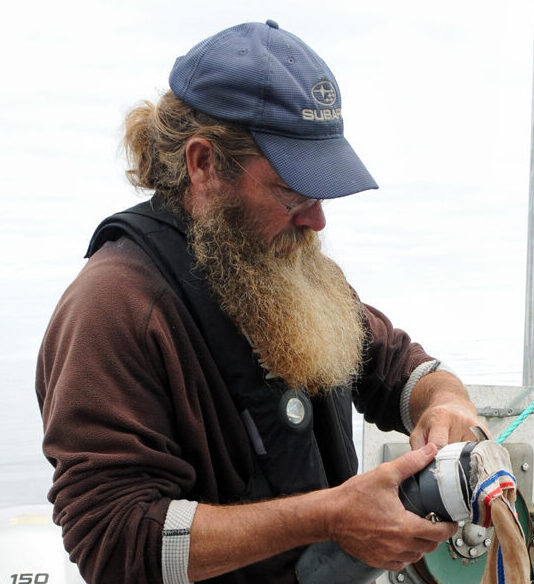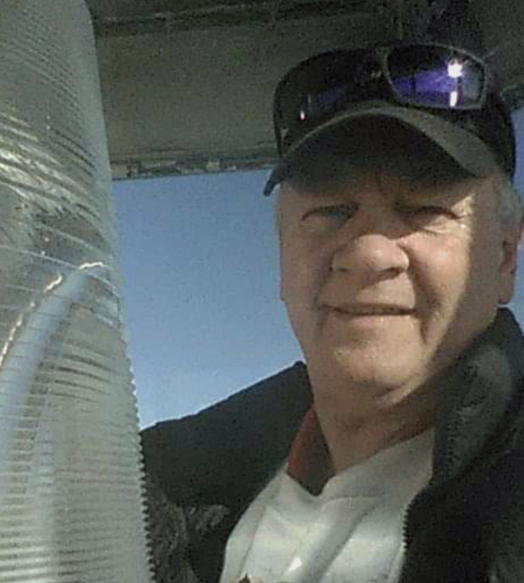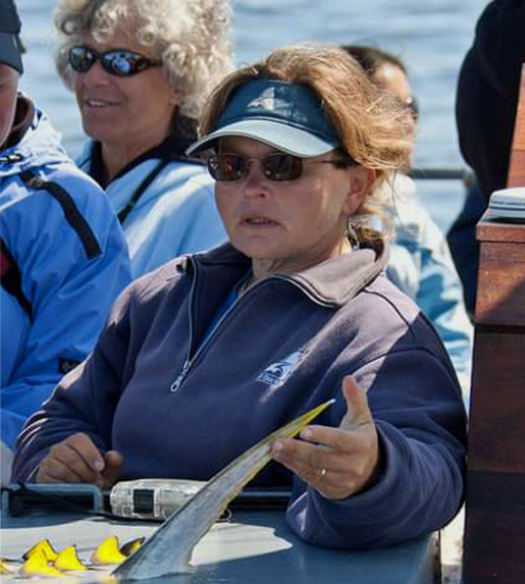Grand Manan Whale
and Seabird Research Station
- 24 Rte. 776, Grand Manan, NB E5G1A1
In 1981, Dr. David Gaskin, a professor at the University of Guelph in Ontario and a pioneer in harbour porpoise research, founded the Grand Manan Whale & Seabird Research Station.
Since its inception the Station has researched harbour porpoises, North Atlantic right whales, seals, seabirds, and more recently, basking sharks and lobsters.
Its proven record of community-based stewardship and conservation initiatives garnered the Station a Gulf of Maine Visionary Award in 2001.
The GMWSRS pioneered the Harbour Porpoise release program in 1991 and has worked extensively with weir fishermen to promote the safe release, conservation and recovery of this species in the Bay of Fundy.
The Canadian Right Whale Recovery Plan, large whale disentanglement networks and ethical whale watching practices education are also an integral part of our efforts.


I was first invited to come to the GMWSRS in 1989 to assist an MSc student with a project that examined the foraging ecology of the large whales that inhabit the Bay of Fundy. I had just finished my BSc (University of Guelph) and really had no idea what I wanted to do except that it would have to be something that involved the ocean!
I fell in love with Grand Manan and The Research Station and knew right away that it would remain an important part of my life.
Decades later, I still return to Grand Manan several times a year to continue doing marine based research. Broadly speaking, I use biologgers and radio tags to examine the movement and migration patterns of various organisms as they transit into, around and out the Bay of Fundy.
Over the years this has included studies on harbour porpoises, various seabird species and currently, the movements and diving behaviour of basking sharks. Recently, I have also worked with several MSc students on a long-term project that is examining changes in the abundance and energetic value of the zooplankton population in the Bay.
I also hold the position of Research Associate at the University of North Carolina Wilmington.

I grew up in Ontario and attended the University of Guelph for both my BSc and MSc degrees.
It was during this time (1992) that I first travelled to The Research Station to work as an undergraduate assistant.
I have returned every year since, all whilst finishing my PhD at Duke, my post doc at Wood’s Hole and landing an academic job at the University of North Carolina Wilmington, where I now serve as Chair of the Department of Biology and Marine Biology. During the past 30 years my work and research at the GMWSRS has evolved from being mostly harbour porpoise based to working more closely with lobsters. The goal of this work is to better understand their reproductive biology and how that relates to the health of the fishery. My colleagues and I are also currently working actively to monitor the year- round seawater temperatures in the Bay of Fundy in the context of global warming, and how that relates to changes we are seeing in the biological community that inhabits the Bay.

An islander born and bred, Ken’s many years of experience on the waters of Fundy have made him the go-to guy for data and biological sample collection. His vast practical experience with the marine mammals, seabirds and other wildlife of the Bay, as well as the many fisheries of the island give him a unique perspective on the need for balancing science and conservation with both economic reality and the changing trends of the biological life of the Bay as well as the waters of the Bay itself.

Laurie Diane Murison, B.Sc., M.Sc., Hon. PhD. Science, left a legacy of achievement for the marine mammals of the Bay of Fundy. Foremost among her contributions was the marine research she undertook for nearly two decades, which proved beyond any doubt the link between North Atlantic right whale mortality and the then-location of the Bay’s shipping lanes through a food-rich area which was the whales’ summer habitat and nursery. Ultimately, the lanes were relocated as a direct result of Laurie’s findings, an unprecedented move in the history of oceans and shipping traffic, and one signed unanimously into law by 167 countries around the world.
Laurie’s work greatly contributed to the survival of the critically endangered North Atlantic right whales in the Bay of Fundy. We remember her with great pride and, above all, gratitude for the joy of having known her.
© 2022 @gmwsrs.ca – Copyright, all rights reserved